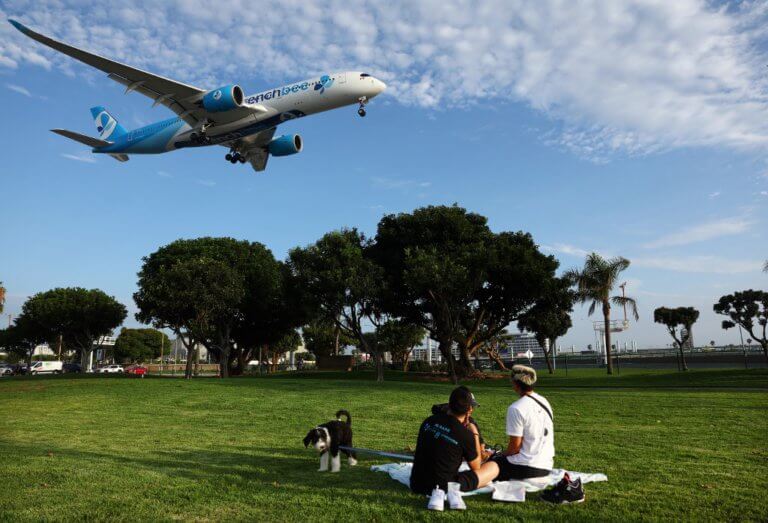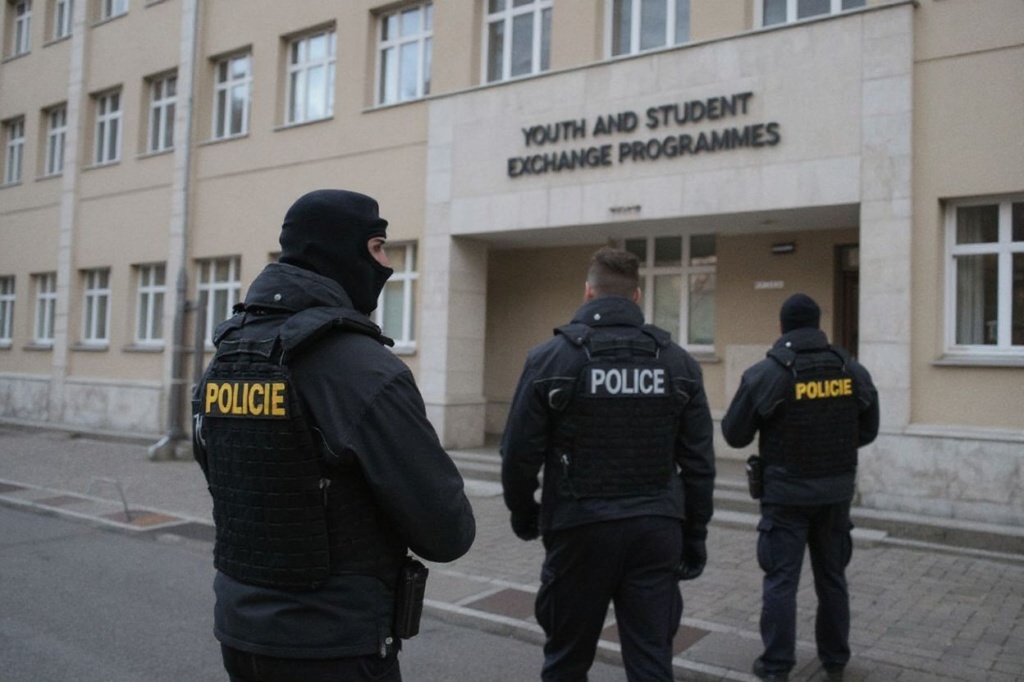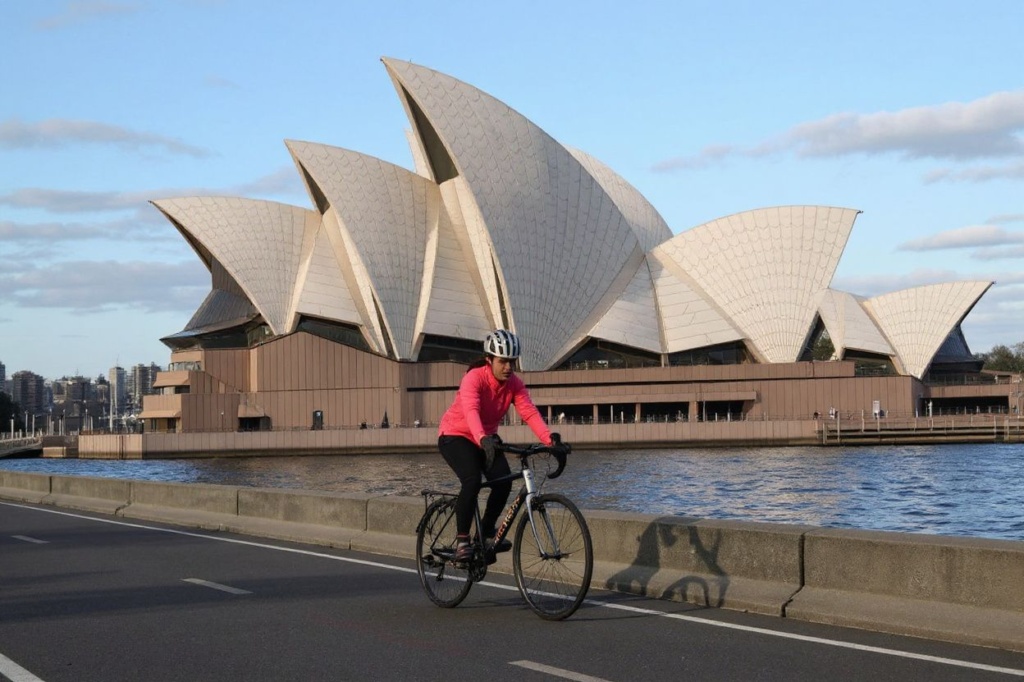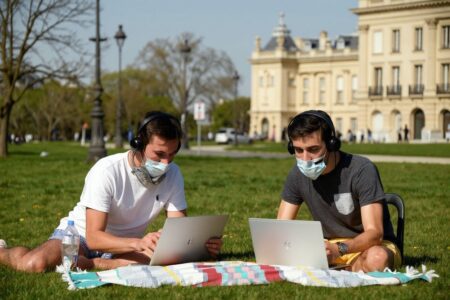
The best part about youth and student exchange programmes is the “exchange” part of things.
It’s seeing a different side of the world, expanding your horizons to new cultures, and opening yourself up to new experiences.
You learn important lessons, discover new things about yourself and the world, and form a lifetime of memories – good and bad – that’ll make great stories to tell when you’re back in the comforts of your own home.
An exchange student programme has the best of a full-time study programme jam-packed into one fulfilling package.
As your time is limited, you’ll have a sense of urgency to get the most out of the programme, whether it’s going on late-night adventures or spontaneous excursions to another town or city.
 Exchange students on a trip to Paris. But don’t forget – aside from having the opportunity to go abroad to a new environment, you’re still there as a student sampling what learning in that institute and country entails.
Exchange students on a trip to Paris. But don’t forget – aside from having the opportunity to go abroad to a new environment, you’re still there as a student sampling what learning in that institute and country entails.
While there’s loads of fun to be had, always remember that studying is a privilege, and the chance to participate in an exchange is a bonus.
Do well and you can add things like how it helped improve your networking and cross-cultural communication skills — all of which make your CV look a little better.
It’s beyond the typical job experience that companies are seeking today. You’ll stand out from the crowd.
Better still, the independence and personal growth you get out of it are phenomenal.
What are youth and student exchange programmes?
You may have heard or read about student exchanges and similar youth programmes before, but what exactly are they?
Youth and student exchange programmes are arrangements between two schools or universities, allowing students to spend some time at a partner school or university (or two).
You are usually required to only pay tuition fees to your home country’s institution instead of the host.
If you’re from a developing country going to a high-income country — for example, India to the US — this makes it an affordable and invaluable learning experience.
Typically, student exchanges are offered to high school students, undergraduates and postgraduates who are seeking an international perspective to their academic pursuits.
These youth and exchange programmes are specifically designed for international students to participate in a blend of academic, social and cultural experiences.
There are a few variations as to how long a youth and student exchange programme lasts.
They can vary from two to four weeks, a whole semester, or even the entire academic term. Students are encouraged to find the best programme that suits their interests and budget.
Most schools and universities have an office or committee that specialises in international student exchanges.
Interested students would have to contact the office to ask about the application process and check if they would be eligible to apply.
Here are some basic requirements for a youth and student exchange programme:
- You’ve been attending school regularly
- You have good grades
- You can communicate in English (Note: there may be an additional requirement for basic language skills of the country that you’re interested in)
- Personal documents, such as a passport, academic transcripts, recommendation letters and so on.
Once accepted, you’ll need to apply for a student visa and supporting documents.
Make a note to check if your insurance has coverage for health or travel, and consider getting one if it doesn’t.
Pro tip: Like in most things in life, always do your research before deciding.
Look up different youth and student exchange programmes and universities in a few countries unless you’re certain that travelling to that specific destination is your one and only dream.
It will also help to research cultural norms there to gain some insight into the do’s and don’ts of living there.
Other things you could do are check out what the local towns have to offer for sightseeing, such as historic sites, museums or heritage parks.
Check out the commutes as well — do they use trams, trains or buses, and what form of payment do they take?
Most importantly, scout out restaurants or supermarkets in the area to ensure you have access to food even on a tight budget.
 Police in front of a university that does youth and student exchange programmes.
Police in front of a university that does youth and student exchange programmes.
Prepare for the worst youth and student exchange programmes — and then some
Like all life experiences, not everything is sunshine and rainbows. It’s easy to be swept away by the glamorous prospects of a study exchange programme. After all, the movies don’t lie – until they do.
One of the biggest problems when it comes to studying abroad is securing an accommodation. While some youth and student exchange programmes have you covered from start to finish (we’re talking about your place of stay, your meals, your transport, and more), some are not as generous.
If you find yourself stranded in an unfamiliar environment with nowhere to go, reach out to your programme provider or your exchange programme’s university’s office for help.
It’s a disconcerting experience, one that Christelle had faced as a language exchange student in Hawaii.
Aside from the host being absent from the week of her and three other language exchange students’ arrival, the house was unhygienic and in bad shape.
Christelle recounts to Swiss public radio RTS a kitchen sink full of worms, unidentifiable things around the rubbish, and the host’s puppies urinating and defecating in the rooms.
To top things off, Christelle and the other students received a text one Friday night at 11:30 p.m. telling them to leave the house immediately with no context whatsoever.
So while you can’t prepare for all the eventualities (no matter how far-fetched it may be), you can always prep yourself best by conducting thorough research on the programme and what they entail as best as you can.
It goes without saying that you should be prepared for sticky situations. Always be aware of your surroundings, learn to be street smart and try your best to stick to local norms.
Familiarise yourself with your surroundings and stay updated with local news in case of any events that might impact your safety.
As an international student, you may be required to carry your passport and/or visa at all times as you go out and about with your day.
Foreign students may become targets of crime, especially theft — Sarah Miller recounts her experience of being mugged while studying abroad, leaving her with a wound on her chin as an unfortunate reminder.
To avoid this, use a secure bag or backpack and keep important items like passports and wallets in a safe, hard-to-reach pocket, preferably with a zip. If possible, walk in groups instead of being alone, even if it’s just one other person.
10 best youth and exchange student programmes
1. USA – CIS Abroad
Over 25,000 students have participated in CIS Abroad’s international student exchanges.
They partner with accredited universities that offer innovative courses to help students meet academic goals and offer a wide range of terms and destinations.
If you’re still unsure of where to go, check out their list of exchanges here.
2. Ireland – Education First
Education First is known to offer a range of comprehensive courses for international students on a global basis, but this one is a favourite – learn English in the charming town of Dublin.
Students will get to learn more about local culture and mingle while taking in the sights and learning about historic buildings.
Learn more about their offerings here, and check out their YouTube channel for more insight!
 Exchange students watching a light display on the Gwanghwamun Gate of Gyeongbok Palace.
Exchange students watching a light display on the Gwanghwamun Gate of Gyeongbok Palace.
3. Korea – Korea University
Korea University has partnered with 1,049 prestigious institutes in over 100 countries around the world to send thousands of students abroad every semester.
They offer a minimum of one semester to a maximum of one year for student exchanges, providing unique opportunities to learn more about different cultures and develop new competencies.
Read more about what they do here.
 Students crossing Shibuya walk.
Students crossing Shibuya walk.
4. Japan – Iwate University
Iwate University offers broad courses for local Japanese students wishing to study overseas, alongside a comprehensive student exchange programme for international students in partner universities.
“The depth of knowledge and experiences I have gained through research at Iwate University is remarkable,” says student Rubel Ahmed.
Check out the details of their outline and list of programmes here.
5. Europe – Erasmus+
This is a widely known European Union student exchange programme and is well regarded for its economics, econometrics and business degrees.
Erasmus+ helps organise student and doctoral candidate exchanges that take place within countries associated with or part of the Erasmus+ programme.
Programmes are available at the bachelor’s, master’s, and PhD levels.
An interview from Medium shows stories from one of Erasmus+’s first batches of students to 11 others who’ve had their share of their life-changing experiences with the exchanges.
Explore their opportunities here.
 A student rides on a bicycle in front of the landmark Sydney Opera House.
A student rides on a bicycle in front of the landmark Sydney Opera House.
6. Australia and New Zealand – The Education Abroad Network (TEAN)
The brainchild of two college students volunteering at a university in Perth, Australia, TEAN was founded when they combined their previous study abroad experiences and interactions with students.
Realising they could create a new programme catered to each student’s preferences and interests, the founders designed a study abroad programme that was highly personalised and provided students with a range of options.
See what they offer here.
7. Germany – IES Abroad
IES Abroad has partnerships with more than 500 global universities and colleges, and their attention to the quality of their programmes and their health and safety practices set the standards for the entire field of study abroad.
Bekah, an Environmental Studies & Sustainability (ESS) Programme exchange student at Freiburg, got to experience the best of Germany’s Green City through explorations with fellow coursemates.
From zero-waste wholesale stores to finding her own coffee haunt, Bekah managed to explore her cultural heritage as well as her environmental aspirations.
Discover the full scale of IES Abroad’s programmes.
 General view of the Sagrada Familia in Barcelona.
General view of the Sagrada Familia in Barcelona.
8. Italy, Spain, and France – SAI Programs
The gateway for English speakers to a transformative study-abroad experience in Italy, Spain or France since 1995, they assure an inspiring and life-changing time, focusing on your safety, personal growth, and academic success.
For Madeleine, immersing herself in a different culture and language in Rome was a unique way to study and learn about the city.
Hailing from Washington, US, she took some time before her studies began to visit Venice, Florence, Pompeii, and Positano to explore Italy, giving her a sample of what the country had to offer.
Find out more about SAI Programs.
9. Taiwan and China – Asia Exchange
Since 2007, Asia Exchange has offered complete assistance in fascinating Asian destinations for student exchange programmes for a semester abroad.
The programme’s flexibility allows almost anyone to have a go at this well-rounded international experience in some of Asia’s most prominent cities.
Studying in Taiwan provided Finland-native Risto with a unique view of the subjects they studied in Europe, hearing an Asian perspective on familiar themes while allowing them to explore the island country renowned for its warmth and friendliness.
Explore the full list of options by Asia Exchange.
10. Hong Kong – Hong Kong Baptist University
With seven faculties and over 400 courses taught in English across more than 40 majors, Hong Kong Baptist University has something for everyone.
The university is partnered with other higher education institutions worldwide, playing both the stage and the platform that launches you to a growing global community.
Learn more about Hong Kong Baptist University’s youth and student exchange programmes.










